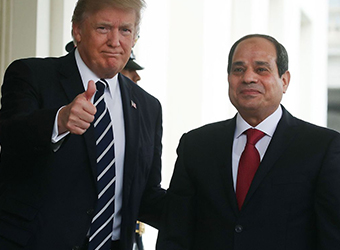With the world’s attention focused on perennial Middle East hotspots like Iraq and Syria, foreign policy experts warn that Egypt bears watching, especially as the Trump administration is struggling to craft a coherent policy to stabilise the region.
Recently, a series of violent incidents targeting Egypt’s minorities has underscored what regional observers say is a fragile social fabric that could easily tear as civil strife and terrorism rear their head. As the most populous country in the Middle East, Egypt is also a longtime U.S. ally — and a strategically important nation in the region that receives more than $1 billion a year in military financing.
In April and May, bombings by the Islamic State (ISIS) targeting Coptic Christians drove home the plight of one of the oldest religious groups in the Mideast. The minority group comprises about 10 percent of Egypt’s 80 million people, a number that has steadily dwindled in recent years in the face of systemic violence.
The plight of Coptics has amplified the stakes for Egypt — home to the Suez Canal, a major hub of maritime activity and more than 7 percent of the world’s seafaring trade — and regional security. The country is seen fighting a war against extremism on multiple fronts, and analysts broadly agree the U.S. is key to helping to prevent Egypt from slipping into calamity.
Mirette Mabrouk, deputy director at the Atlantic Council, a U.S. think tank, told CNBC recently that a destabilised Egypt would be “disastrous for the entire region. The consequences would be horrific for the important military institutions, financial institutions and the Suez Canal.”
Beset by Islamic State radicals and its own battle against the Muslim Brotherhood, Egypt “has seen extremist violence increase,” said Allison McManus, research director of the Tahrir Institute for Middle East Policy, to CNBC recently. Along with her colleague Amr Kotb, McManus writes a quarterly synopsis of Egypt’s security issues.
“The average monthly rate of terror attacks nationwide more than doubled from 2013 to 2016, with increased sectarian attacks and targeting of civilians,” McManus added.
In a region where security is deteriorating because of conflicts in neighboring countries, Egypt’s own tenuous control over extremism matters for U.S. policy, experts warn. A destabilised Egypt could become a magnet for jihadi groups, creating new policy headaches for American objectives in the region.
“The U.S. relies on a stable Egypt for a wide range of priorities, as Egypt is a fulcrum for regional stability given its strategic location and size,” Kotb told CNBC, who warned of a regional domino effect should the country be overrun by Islamic fundamentalists.
“As far as many U.S. policymakers are concerned, continued U.S. engagement in Egypt today is a byproduct of the belief that if Egypt falls, so will the rest of the region,” he added.
‘Fight these destabilising elements’
As part of a crackdown on extremism in the country, President Abdel Fattah al-Sisi has come under intense scrutiny from human rights advocates. A few experts argue that the encroachment of ISIS in the country and the region calls for a tough response.
“With ISIS branches operating in Sinai, I think it’s about time for the U.S. to extend its support to [Egyptian] President Sisi’s efforts to fight these destabilising elements,” said Sasha Toperich, senior fellow and director of the Mediterranean Basin Initiative at Johns Hopkins University’s Center for Transatlantic Relations.
The interests of Egypt and the U.S. commingle in various ways, including the Israeli-Palestinian conflict. Egypt has positioned itself as an honest broker in negotiations in the long-running conflict, and is a linchpin in efforts to choke off the smuggling of weapons to the terrorist group Hamas, Toperich added.
Analysts also say that strong military ties between the U.S. and Egypt are key to projecting American power in the region and boosting Egyptian security. The country plays host to Operation Bright Star — the largest U.S. military exercise in the world that takes place every two years. The last scheduled operation was in 2009, four years before former President Barack Obama canceled the event in protest over Egypt cracking down on demonstrators. The one set for 2011 was postponed by the revolution. Bright Star is expected to resume under President Donald Trump.
Yet a number of Egypt watchers believe the path to peace runs through Egypt, and the U.S. should do more to strengthen the country in the face of global terror, including the provision of more military assistance.
“The reality is that much more must happen … in order to combat sectarianism in the country, and it is important that United States officials continue to insist on this fact publicly and in private,” said the Tahrir Institute’s Kotb.
“A re-examination of America’s relationship with Egypt, particularly with regard to funding, is long overdue … the country is dealing with a real insurgency in North Sinai, one which the security assistance package has failed to properly equip the Egyptians to combat,” he added.
Source: CNBC


